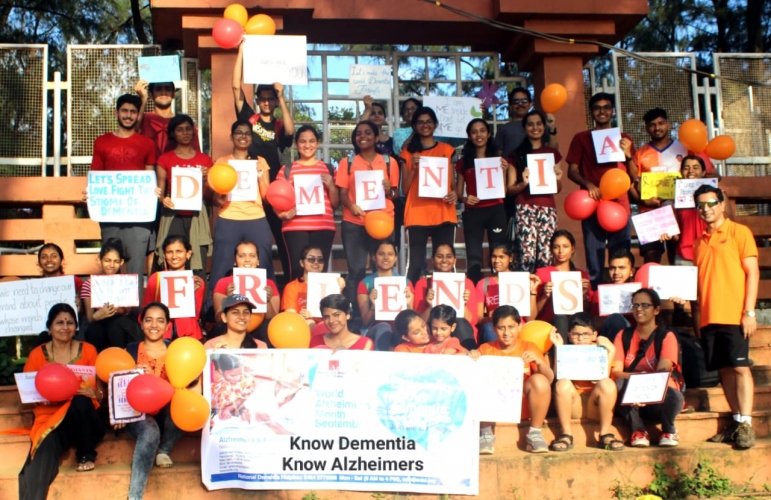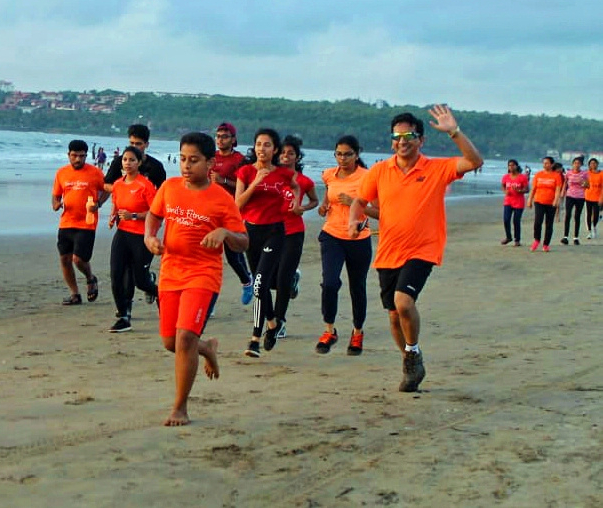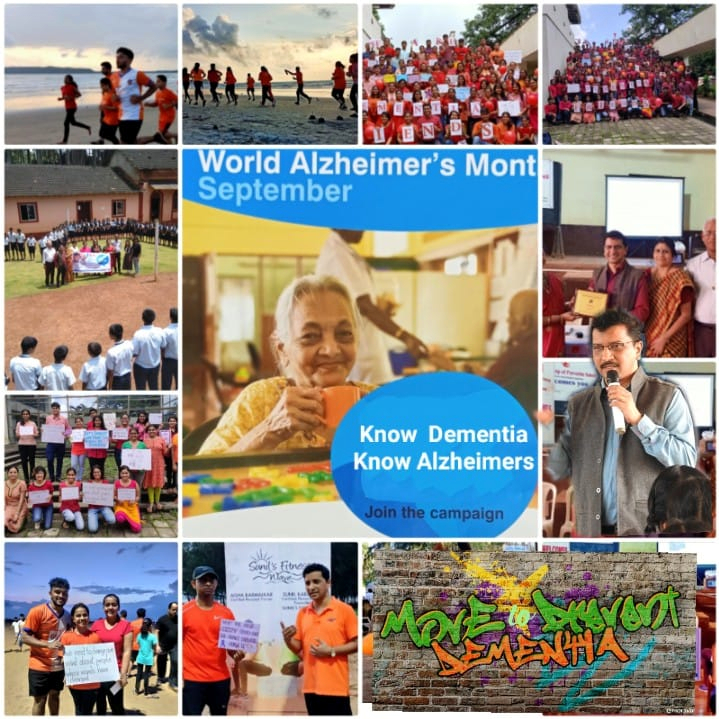Atal Sethu to be lit up in Purple on World Alzheimer’s Day

Students from GMC and other colleges gathered for an Alzheimer’s awareness run at Miramar beach in 2019. [FILE PHOTO]
It’s been 21 years since the dementia awareness programme was launched in Goa. This year, Alzheimer’s Disease International has the theme “Know Dementia, Know Alzheimer’s” on World Alzheimer’s Day (September 21) to highlight the importance of recognising signs of dementia as the first step to optimal care.
In a very symbolic gesture, the iconic Atal Sethu at Mandovi River will be lit up in Purple, the theme colour for the awareness campaign on World Alzheimer’s Day. It is symbolic of the fact that we need to bridge the awareness and treatment gap for dementia in our country. I am grateful to the GSIDC and the dean of GMC for making this possible.
DEMENTIA, ALZHEIMER’S DISEASE
Dementia is the umbrella term for a group of progressive, degenerative brain conditions that result in memory loss, difficulty in thinking, behaviour and emotion. It’s is not normal part of ageing as it is often thought to be. Alzheimer’s disease is the most common form of dementia and contributes to almost 60% of all types of dementia.
PUBLIC HEALTH CONCERN
Dementia is a major concern in Goa as we have a higher life expectancy compared to the national average. People live longer and also risk getting health problems associated with ageing, such as dementia. Secondly, a large proportion of our adults migrate abroad for better prospects, leaving behind their elderly parents. If they get dementia, they find it difficult to attend to them. The traditional joint family system is dwindling away.
 We have over 4 million people estimated with dementia in India. The World Health Organisation and ADI estimate that this number is around 55 million in the world. There are 10 million new cases every year and approximately one every three seconds. What is worse is that the numbers are rising at a faster rate in the low and middle income countries such as India. The WHO has declared it a major public health concern in the world.
We have over 4 million people estimated with dementia in India. The World Health Organisation and ADI estimate that this number is around 55 million in the world. There are 10 million new cases every year and approximately one every three seconds. What is worse is that the numbers are rising at a faster rate in the low and middle income countries such as India. The WHO has declared it a major public health concern in the world.
DEALING WITH DEMENTIA
As the theme “Know Dementia, Know Alzheimer’s” suggests, we need to start with raising awareness in the community. Next, build capacity, establish memory clinics at tertiary and secondary health centres to arrive at correct diagnosis, assessment by a health team and initiate appropriate treatment. Build the capacity of primary health physicians and outreach workers, anganwadi workers to identify early signs of dementia and provide the much-needed post-diagnostic care so patients and family need not repeatedly visit tertiary centres for care.
Our research on non-pharmacological interventions for families of people with dementia was found very effective in reducing stress in caregivers, reducing behavioural problems in people with dementia and in improving quality of life. This can be easily integrated in the Primary Health Care set up with the help of training. We should also work on building long-term care facilities if home care is not possible. Caregiver training and cognitive stimulation was found to be very useful in the care management.
There is need for action among policy makers, healthcare teams and the community at large. Goa can be the first dementia-friendly state. We have extremely good healthcare network and committed people at all levels. Dementia services are now part of the national programme for healthcare of the elderly.
PREVENTING DEMENTIA
I had the privilege of being part of the Lancet Commission on Prevention of Dementia which published research findings last year. We found that 12 risk factors contribute to 40% of people with dementia and therefore, a targeted approach at risk reduction can potentially delay or protect a significant number of people from getting dementia.
One should remember that the underlying pathology in Alzheimer’s disease starts much before the onset of symptoms, which means the steps for prevention and lifestyle modification start earlier in life. Increase education, physical activity and social contact as they tend to protect an individual against Alzheimer’s disease and dementia.
On the other hand, one must decrease high blood pressure, obesity, smoking, depression, diabetes, excessive use of alcohol, head injury, hearing loss and air pollution as they are risk factors for dementia.
MOVE TO PREVENT DEMENTIA CAMPAIGN
We recently launched the ‘Move to Prevent Dementia’ Campaign, to promote brain health and prevent cognitive decline. This is a campaign to encourage Physical Activity (Move) as it is found to be an important factor to prevent dementia. Given Covid restrictions, we are conducting this campaign on social media, where we challenge people to learn a few dance steps and upload their videos on social media to express their support to dementia with the hashtag #movetopreventdementia.
 By doing this, we hope to attract attention, raise awareness, make a commitment to fight dementia and encourage others.
By doing this, we hope to attract attention, raise awareness, make a commitment to fight dementia and encourage others.
People in Goa love to dance and we hope this campaign will spread awareness in an exciting and unique manner. There is scientific basis for the campaign. Dance is a form of physical activity and synchronised steps act as a cognitive stimulation exercise. Moreover, it’s a fun activity, involves new learning and releases stress, also important for prevention of dementia.
The Alzheimer’s and Related Disorder’s Society of India has been conducting several programmes to raise awareness in the country. The St Luke’s Medical Guild will conduct a webinar for doctors. On the eve of Alzheimer’s day, we had a musical awareness programme with the band ‘Silver Linings’ on facebook.
In the last 21 years, a lot has changed in Goa and there is increasing awareness on this condition, but much more needs to be done. This Alzheimer’s day, let us learn about dementia and make a commitment to raise awareness on dementia.
DEMENTIA: 10 WARNING SIGNS
* Recent memory loss
* Poor or decreased judgement
* Misplacing things
* Difficulty in performing familiar tasks
* Disorientation in time, place
* Problems in language
* Problems keeping track of things
* Changes in mood and behaviour
* Trouble with images
* Withdrawal from social activities
(Dr Amit Dias, Asst Professor in the GMC’s Department of Preventive & Social Medicine, was one of the experts on the Lancet Commission that published scientific evidence on prevention of Alzheimer’s disease and other causes of dementia. He has been involved with the Alzheimer’s awareness movement in Goa and India for two decades and has won several awards for his research on dementia.)